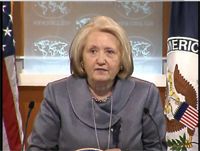Office of Global Women's Issues
 Sign up for Global Women's Issues email updates.
Sign up for Global Women's Issues email updates. Follow the Office of Global Women’s Issues on Twitter and Facebook:![]() Twitter
Twitter![]() Facebook
Facebook
 Excerpt from Roundtable Remarks, Secretary of State Hillary Rodham Clinton with NGOs and Activists on Sexual and Gender-Based Violence Issues
Excerpt from Roundtable Remarks, Secretary of State Hillary Rodham Clinton with NGOs and Activists on Sexual and Gender-Based Violence Issues(Aug. 11): "I have just come from a meeting with two survivors of sexual attacks. The atrocities that these women have suffered, which stands for the atrocities that so many have suffered, distills evil into its basest form. The United States condemns these attacks and all those who commit them and abet them. And we say to the world that those who attack civilian populations using systematic rape are guilty of crimes against humanity. These acts don't just harm a single individual, or a single family, or a single village, or a single group. They shred the fabric that weaves us together as human beings. Such atrocities have no place in any society. ... In the face of such evil, people of good will everywhere must respond. The United States is already a leading donor to efforts aimed at addressing these problems. And today I am announcing that we will provide more than $17 million in new funding to prevent and respond to gender and sexual violence in the DRC. " Full Text | Ambassador Verveer on Gender-Based Violence in the Democratic Republic of the Congo
 Ambassador-at-Large Melanne Verveer Briefs on U.S. Commitment to Afghan Women
Ambassador-at-Large Melanne Verveer Briefs on U.S. Commitment to Afghan Women(June 30): "The women in Afghanistan are critical to progress and stability in their war-torn country. It is in Afghanistan’s interest that human development and the unity of action take place. Only by men and women working together can Afghanistan move forward. The Secretary of State and Ambassador Holbrooke asked me to go to Afghanistan to reaffirm the United States’s commitment to Afghan women and to underscore the President and Secretary’s personal commitment to women’s rights." Full Text
 Ambassador-at-Large Melanne Verveer speaks at the “Congress of Polish Women” in Warsaw
Ambassador-at-Large Melanne Verveer speaks at the “Congress of Polish Women” in Warsaw (June 21): The event celebrates 20 years since the advent of democracy in Poland and critically examines women’s roles in contemporary Polish society: the achievements that have been made and the challenges that remain. Photo Gallery
 Swearing-In Ceremony of the Honorable Melanne Verveer
Swearing-In Ceremony of the Honorable Melanne VerveerSecretary Clinton (June 12): "I was pretty lucky that Melanne was willing to accept this nomination to be our first ever ambassador on behalf on the issues and the causes and the women and girls that she has worked for so many years. (Applause.) She’s exactly the kind of diplomat that we need in the 21st century to exercise what we call smart power. And I am so pleased that the President agreed with me that there wasn’t any other choice for this job." Full Text
 President Obama Calls Attention to Women’s Rights in Cairo Speech
President Obama Calls Attention to Women’s Rights in Cairo Speech(June 4): The sixth issue that I want to address is women's rights. I know…and you can tell from this audience, that there is a healthy debate about this issue. I reject the view of some in the West that a woman who chooses to cover her hair is somehow less equal, but I do believe that a woman who is denied an education is denied equality. And it is no coincidence that countries where women are well educated are far more likely to be prosperous.
Now, let me be clear: Issues of women's equality are by no means simply an issue for Islam. In Turkey, Pakistan, Bangladesh, Indonesia, we've seen Muslim-majority countries elect a woman to lead. Meanwhile, the struggle for women's equality continues in many aspects of American life, and in countries around the world.
I am convinced that our daughters can contribute just as much to society as our sons. Our common prosperity will be advanced by allowing all humanity -- men and women -- to reach their full potential. I do not believe that women must make the same choices as men in order to be equal, and I respect those women who choose to live their lives in traditional roles. But it should be their choice. And that is why the United States will partner with any Muslim-majority country to support expanded literacy for girls, and to help young women pursue employment through micro-financing that helps people live their dreams. Full Text
 Ambassador-at-Large Addresses Women Entrepreneurs Association in Turkey
Ambassador-at-Large Addresses Women Entrepreneurs Association in Turkey (May 31): Ambassador Verveer traveled to Turkey to address the Women Entrepreneurs Association of Turkey’s inaugural Leadership Summit. She also participated in a week of programs coordinated by the Embassy. Photo Gallery
 Ambassador-at-Large Verveer Testifies on Women Issues
Ambassador-at-Large Verveer Testifies on Women Issues(May 13): "Let me preface my remarks by saying that violence against women as a tool of armed groups is in no way limited to the Democratic Republic of Congo and Sudan, or just to Africa. We’ve seen this in Bosnia, Burma, Sri Lanka and elsewhere. The underlying problems – gender inequality and the dehumanization of women – are often the same, and our assessment of needs and recommendations is similar across regions." Full Text
The Office of Electronic Information, Bureau of Public Affairs, manages this site as a portal for information from the U.S. State Department. External links to other Internet sites should not be construed as an endorsement of the views or privacy policies contained therein.

